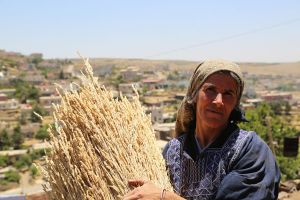Good Rains Bring Some Hope For War-Torn Syrians
Food security in parts of Syria is slightly better than the same time last year due to an improved security situation and enhanced access to humanitarian assistance, but the overall situation remains far worse than before the war, two UN agencies warned on Jul 18.

Each month, WFP provides food assistance to four million people across Syria.
The latest Crop and Food Security Assessment Mission (CFSAM) conducted by the Food and Agriculture Organization of the United Nations (FAO) and the World Food Programme (WFP) estimates total wheat production at 1.8 million tonnes - 12 percent more than last year’s record low but still less than half of the pre-conflict ten-year average.
The mission’s report released estimates that 6.9 million Syrians are still food insecure while an additional 5.6 million people are likely to become food insecure without the regular food assistance they receive every month on Jul 18.
“For some Syrian families, there is a small shaft of light in the darkness,” said Adam Yao, Acting FAO Representative in Syria. “Despite the immense challenges, agriculture continues to provide food for the country. With the evolving security situation, more farmers are expected to have access to cultivate their land again. Now is the time to step up our support, as agriculture is more important than ever for the livelihoods of many.”
“The small improvement in the availability of food for Syrians is promising, but the needs remain high. More must be done to provide food for families affected by the crisis,” said Jakob Kern, WFP Representative and Country Director in Syria. “WFP and FAO are working together to make food security a reality for the people of Syria.”
Access by humanitarian organizations to some besieged areas has improved compared to last year. Yet access continues to be heavily constrained in Deir-ez-Zor, where life-saving air-drops of food and other supplies continue, and in Ar-Raqqa where the situation has become critical due to continued fighting. In Ar-Raqqa, shops are destroyed and the cost of the standard food basket has jumped by 42 percent between May and June this year.
Rain helps crop production
Better rainfall within the Euphrates River watershed has meant greater water flows and higher water levels in many of the country’s reservoirs. Wheat and barley production slightly improved in 2017 compared to last year due to the better rainfall and improved access to agricultural land in some areas. Main constraints continue to be the high cost or unavailability of inputs, such as seeds and fertilizer, and the destruction of infrastructure for irrigation and storage.
Pasture conditions have improved because of the better rainfall, which will partially ease pressure from high fodder prices. Herd sizes have stabilized albeit at a very low level. The main constraints continue to be high fodder prices, insufficient coverage of veterinary services and insecurity that limits access to grazing areas in some parts of the country.
Gradual improvements in security and the opening of some key supply routes have allowed trade to slowly recover and urban markets to function in several parts of the country. In parts of eastern Aleppo where the entire infrastructure and markets have been heavily destroyed, recovery has started at a very slow pace. Across the country, food prices continue to be close to the record high, with the exception of the governorates of Deir-ez-Zor, Al-Hasakeh and Rural Damascus.
Methodology
The mission team visited the country in May this year. Information from official sources on crop production and food security was triangulated and cross-checked with direct field observations and information gathered from interviews with farmers, millers, traders, livestock owners, displaced families, returnees, and other people in rural and urban areas. Satellite imagery and rainfall records were also used, as well as data from surveys conducted using WFP’s mobile Vulnerability Analysis and Mapping (mVAM) tool.
This is the fourth CFSAM to Syria since the onset of the crisis and each mission provides an impartial and balanced assessment of the agricultural and food security situation in the country.
Source:World Food Programme
- 259 reads
Human Rights
Ringing FOWPAL’s Peace Bell for the World:Nobel Peace Prize Laureates’ Visions and Actions

Protecting the World’s Cultural Diversity for a Sustainable Future

The Peace Bell Resonates at the 27th Eurasian Economic Summit

Declaration of World Day of the Power of Hope Endorsed by People in 158 Nations

Puppet Show I International Friendship Day 2020

